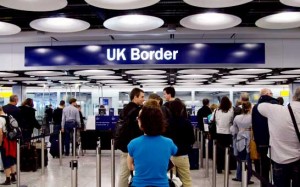UK squeeze on migrants hurting the economy
 The UK Government’s new restrictions on migration are having a negative impact on the nation’s economic outlook, according to new research.
The UK Government’s new restrictions on migration are having a negative impact on the nation’s economic outlook, according to new research.
A study by Oxford University’s Migration Laboratory says that government curbs on highly skilled migrants have shrunk the pool of international talent available to business and have also fallen short of their objective of controlling migration.
The study challenges British Prime Minister David Cameron’s insistence that his party’s attempts to reduce net migration are still allowing the “brightest and the best” overseas workers into Britain.
Companies struggling to employ skilled staff from the US and emerging markets had already warned that they were increasingly looking within the EU for specialists who could not be found in the UK.
But Conservative government ministers have brought in a range of tighter curbs on working migrants to the UK in an effort to meet the prime minister’s 2010 promise of driving down net migration to the “tens of thousands” by the next election.
Figures released in May by the UK’s Office for National Statistics showed that net migration was now at 212,000 – more than double the figure ministers are trying to hit.
The study helps to explain why the stricter controls, started in 2011, have been only partially effective in helping meet the target: the 39 per cent drop in recruits from outside Europe has been countered by a 53 per cent rise in new arrivals of highly skilled migrants coming in from long-standing EU countries such as France, Germany and Spain.
The UK’s Business Secretary Vince Cable described the findings as “deeply worrying”.
“The net migration target, which was not government policy, has clearly had a damaging impact on UK plc by reducing the talent pool available to companies based here,” he said.
“The harder we make it for international companies to employ the very best executives, the harder it is to sell the UK as a place to do business and foster employment opportunities.”
Mr Cable, a Liberal Democrat in the Conservative-Liberal Democrat coalition has a history of clashing with his Conservative colleagues over immigration policy.
He said that investment decisions were “nationality blind”, but contingent on experts from overseas being able to “set up plants and factories, or forge new business links” in Britain.
Despite the increases from the EU, some businesses might still be facing a shortfall of expert employees, because the surge from Europe is not enough to make up for the drop from elsewhere.
Overall, the data shows the number of highly skilled migrant workers in the UK dropped 10 per cent, from 270,000 to 242,000, between 2011 and 2013.
The study’s figures, calculated using the UK Labour Force Survey, represent migrant workers who have been in Britain for less than three years, rather than the entire stock of overseas employees in the country.
Simon Walker, director-general at the Institute of Directors, said the fall in numbers of non-EU migrants and rise in skilled European migrants meant a “lose-lose situation”, which was “very much in contrast” to the government’s drive for productivity and competitiveness.
Commenting on the findings Nigel Heap, managing director of Hays UK & Ireland, said: “The research showing that numbers of highly educated non-EU migrants to the UK have fallen in the past three years raises alarm bells.
“We see skill shortages for highly-skilled workers in sectors including IT, engineering and life sciences on a daily basis, and it has a real impact on the potential growth of the UK.
“Where the supply of talent falls short of demand, looking outside the UK and EU for these highly-skilled workers can be a necessity.
“If hurdles are put in place to stop this happening, the reality is jobs remain vacant; employers are understaffed, unable to grow, and ultimately choose to base their operations where they have the flexibility to find the skills they need. Employers need the confidence to recruit the skills they need without fear of being caught out by shifting immigration restrictions, and if they do not have this confidence in the UK they will look elsewhere,” Mr Heap said.












